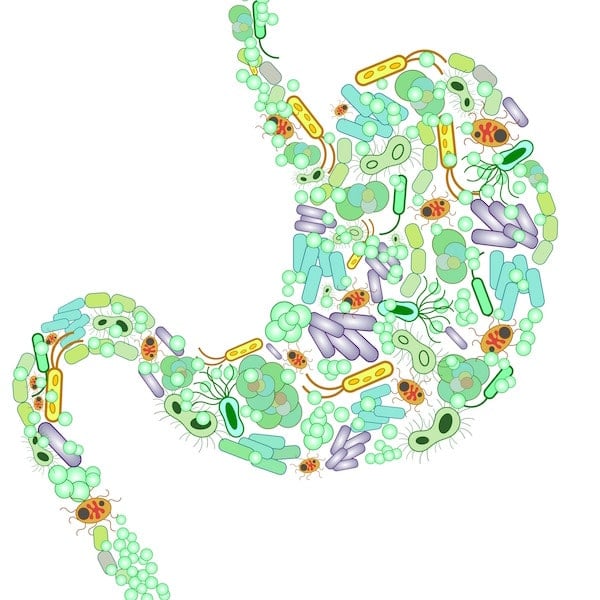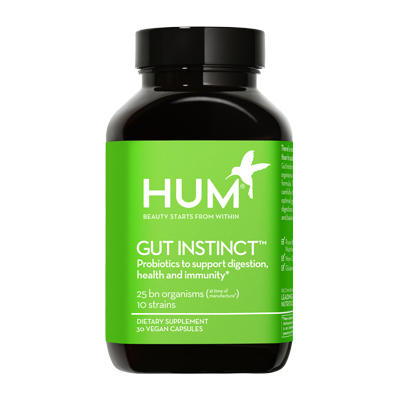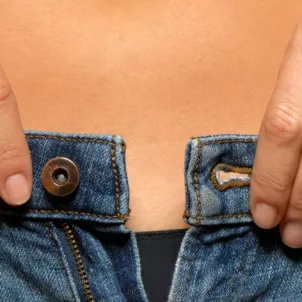*Everything comes down to poop.*
At brunch recently, a friend brought up her IBS like we were discussing the selection of cold-pressed juices on the menu. My first instinct was to clutch my metaphorical pearls, but then it got me thinking. We live in a culture where sharing every aspect of our lives is the norm. So why aren’t more people talking about digestion? It’s certainly a relevant topic: Around one in three people have digestive issues (source: HUM survey). In light of this issue, let’s open up the discussion for a down ‘n dirty talk about digestive health (yes, even the “distasteful” topics).

 Certain bacteria are essential to your health, especially when it comes to your gut. Your gut bacteria keep your digestive system running smoothly since they help to digest your food, and also keep bad bacteria at bay. But certain things can throw off the balance of your gut bacteria. Antibiotics, for instance, kill both harmful and beneficial bacteria.
When your gut bacteria are out of whack, it throws off your digestive system. The result: irregular bowel movements (read: constipation or diarrhea).
That’s where probiotics come in, as they help replenish the good bacteria in your gut. (Our probiotic, Gut Instinct, contains 10 strains of probiotics and 25 billion organisms.)
Certain bacteria are essential to your health, especially when it comes to your gut. Your gut bacteria keep your digestive system running smoothly since they help to digest your food, and also keep bad bacteria at bay. But certain things can throw off the balance of your gut bacteria. Antibiotics, for instance, kill both harmful and beneficial bacteria.
When your gut bacteria are out of whack, it throws off your digestive system. The result: irregular bowel movements (read: constipation or diarrhea).
That’s where probiotics come in, as they help replenish the good bacteria in your gut. (Our probiotic, Gut Instinct, contains 10 strains of probiotics and 25 billion organisms.)

via Giphy
Your Digestive System: An Overview
Hollow organs that run from your mouth to your anus make up your gastrointestinal tract (GI tract). When you put food in your mouth, the digestive process has already started. Your saliva starts to break down starches. When you swallow, that food travels through your esophagus into your stomach, where your stomach acid starts to break down proteins. The next stop: the small intestine. Most of the nutrients from your food are absorbed here. The food you ate is mixed with digestive juices from your intestine, pancreas, and liver to break down starches, protein, and carbs. The waste from this then travels to your large intestine, which absorbs any water and nutrients that may remain, and turns the waste solid. Your intestines also contain a plethora of good bacteria that help digest your food, vanquish pathogens, and produce vitamins. An optimally functioning digestive system can help you maintain a healthy weight, clear up your skin, and even boost your energy. (Read more about how your gut health impacts your entire body.) But the truth is many of our digestive systems aren’t functioning at their very best. For the purposes of this piece on poop, poor digestive health can result in diarrhea, constipation, and bloating.The Signs of a Healthy Bowel
You may think that simply going number two every day is the sign of healthy bowel function. But it can vary from person to person. Generally, a healthy bowel means you poop one to three times a day. If you go more or less, that can still be healthy. However, you should always be able to poop easily. Also, healthy bowel movements should be a certain consistency. For reference, take a peek at the Bristol Stool Chart. Normal poop should be a type three or four.The Perfect Poop Position
Since the Squatty Potty has become relatively mainstream, more people are looking into the best pooping position. Giulia Enders, microbiologist and author of Gut: The Inside Story of Our Body’s Most Underrated Organ (a truly fascinating read), recommends that you squat when you poo. Why? Because your bowels aren’t designed to open up completely when you’re fully sitting or standing. Squatting with your feet on a stool and leaning forward makes it easier to defecate, and is a more natural position than sitting fully. (Bonus: it’s also a timesaver!) She also says that instances of diverticulitis (an inflammation in the digestive tract) are much less common among people who squat to poop than people who sit.The Scoop on Good Gut Bacteria
 Certain bacteria are essential to your health, especially when it comes to your gut. Your gut bacteria keep your digestive system running smoothly since they help to digest your food, and also keep bad bacteria at bay. But certain things can throw off the balance of your gut bacteria. Antibiotics, for instance, kill both harmful and beneficial bacteria.
When your gut bacteria are out of whack, it throws off your digestive system. The result: irregular bowel movements (read: constipation or diarrhea).
That’s where probiotics come in, as they help replenish the good bacteria in your gut. (Our probiotic, Gut Instinct, contains 10 strains of probiotics and 25 billion organisms.)
Certain bacteria are essential to your health, especially when it comes to your gut. Your gut bacteria keep your digestive system running smoothly since they help to digest your food, and also keep bad bacteria at bay. But certain things can throw off the balance of your gut bacteria. Antibiotics, for instance, kill both harmful and beneficial bacteria.
When your gut bacteria are out of whack, it throws off your digestive system. The result: irregular bowel movements (read: constipation or diarrhea).
That’s where probiotics come in, as they help replenish the good bacteria in your gut. (Our probiotic, Gut Instinct, contains 10 strains of probiotics and 25 billion organisms.)
Probiotics for Diarrhea
Studies have shown that L. casei, a probiotic, can significantly decrease the occurrence of diarrhea. (This same strain has been found to decrease symptoms of anxiety.) Other strains of lactobacilli bacteria are effective against diarrhea. Bifidobacterium have been shown to help with diarrhea, including diarrhea brought on by an infectious disease, traveler’s diarrhea, and irritable bowel diseases. Long story short: Probiotics help your good gut bacteria flourish and improve bowel function. Probiotics can even help alleviate symptoms of abdominal pain and bloating in people with irritable bowel syndrome.Probiotics for Constipation
Research appears to indicate that supplementing with bifidobacterium can help with constipation. Researchers at King’s College in London looked at multiple studies and found that supplementing with bifidobacterium increased the number of times subjects pooped each week by 1.3 times. Whether you’re constipated, have diarrhea, or experience other gastrointestinal distress, supplementing with probiotics can be beneficial to help your gut bacteria thrive and help you feel better when you poop.More like this









